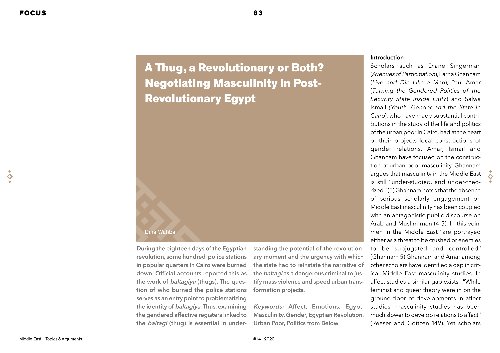A Thug, a Revolutionary or Both? Negotiating Masculinity in Post-Revolutionary Egypt
During the eighteen days of the Egyptian revolution, some hundred police stations in popular quarters in Cairo were burned down. Official accounts reported this as the work of baltagiya (thugs). The question of who burned the police stations serves as an entry point to problematizing the identity of...
Gespeichert in:
| 發表在: | Middle East - Topics & Arguments |
|---|---|
| 主要作者: | |
| 格式: | Artikel (Zeitschrift) |
| 語言: | 英语 |
| 出版: |
Philipps-Universität Marburg
2020
|
| 主題: | |
| 在線閱讀: | 在線閱讀 |
| 標簽: |
添加標簽
沒有標簽, 成為第一個標記此記錄!
|
| 總結: | During the eighteen days of the Egyptian revolution, some hundred police stations in popular quarters in Cairo were burned down. Official accounts reported this as the work of baltagiya (thugs). The question of who burned the police stations serves as an entry point to problematizing the identity of baltagiya. Thus, examining the gendered affective registers linked to the baltagi (thug) is essential in understanding the potential of the revolutionary moment and the urgency with which the state had to reinstate the narrative of the baltagi as a dangerous criminal to justify mass violence and speed urban transformation projects. |
|---|---|
| DOI: | 10.17192/meta.2020.14.8265 |
 Publikationsserver
Publikationsserver